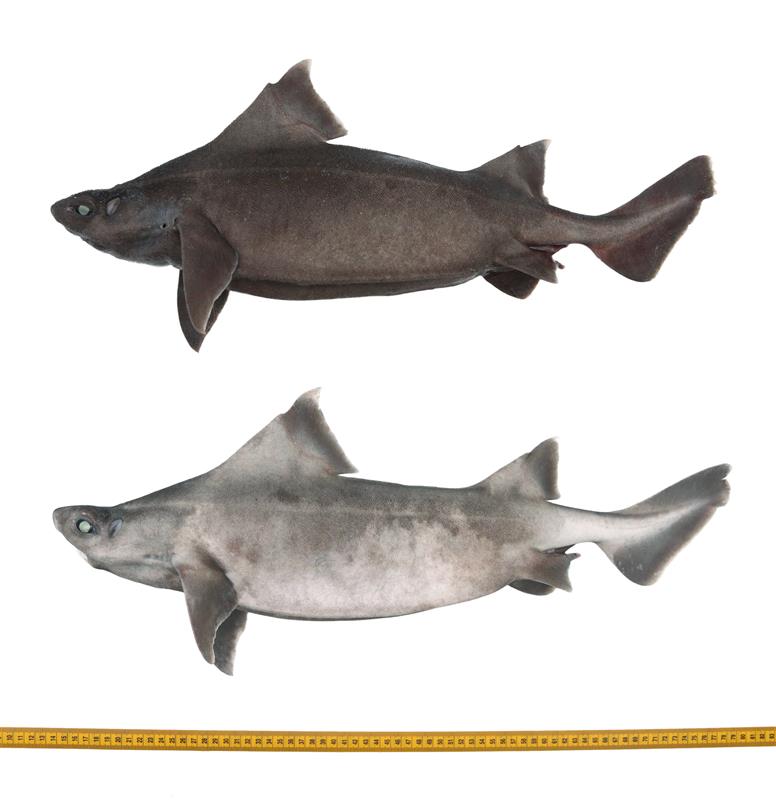A rare deep-sea shark has been caught off the coast of Albania exhibiting an unusual skin pigment disorder that has turned it ghostly white. It is the first known case of this species of piggy-faced shark having leucism.
The angular roughshark (Oxynotus centrina) is an odd sea beastie. They look like someone smashed the idea of a shark with a kid’s drawing of a pig – they have a small, squat body, wide-set eyes, a pinkish snout, large nostrils, and distinct dermal denticles (tooth-like scales that cover shark bodies) which gives them an almost fuzzy look.
These sharks are found across the eastern Atlantic, from Norway to South Africa, and are known to inhabit the Mediterranean too. They are typically found between 60 and 600 meters (197 to 1,968 feet) below the surface. They are also critically endangered, which has meant they are increasingly hard to find, despite their relatively wide distribution.
A recent specimen caught by commercial trawlers off Sazan Island – an uninhabited military zone off the coast of Albania – was rarer still. It has leucism, a rare pigment condition that causes an animal’s skin, feathers, scales or cuticles to appear pale or whiter.
Angular roughsharks are usually a dark, brownish color, which is ideal for lurking in the ocean’s depths, but the recently caught specimen is pale and almost white in comparison.
Image courtesy of Andrej Gajić, Sharklab ADRIA
The condition is similar to but still distinct from albinism. In the latter case, the animal experiences the complete loss of melanin pigment in all its cells, which makes it appear white or yellowish, and gives it red or pink eyes. Leucism, in contrast, is a partial loss of pigment, so the white coloration is less pronounced or less uniform and it also doesn’t affect the animal’s eyes.
Angular roughsharks are typically dark gray-brown or even black, which helps them blend into the dark environments they inhabit – but this specimen, described in a new study, was ghostly pale with white-gray patches. Despite its unusual color, the shark was otherwise healthy and seemed unaffected by its condition.
“Some research [suggests] that a lack of pigmentation may make individuals more visible to both predators and prey, potentially reducing their chances of survival,” lead author Andrej Gajić, the director of the Sharklab ADRIA in Albania and National Geographic Explorer, told IFLScience.
“However, our discovery, along with several other recent observations of healthy adult sharks with pigment disorders, preliminary implies that these anomalies do not significantly affect their feeding abilities or ability to evade predators, nor do they impede sexual maturity and reproduction.”
Andrej Gajić examining the pale angular roughshark.
Image courtesy of Andrej Gajić, Sharklab ADRIA
Although both pigment disorders are rare, leucism is slightly more common than albinism more generally. However, few cases have ever been recorded in sharks.
“Pigment disorders such as albinism and leucism are exceptionally rare among sharks and their relatives, with only 15 documented cases among deep-sea species”, Gajić added.
The conditions are mostly caused by genetic disorders that may disrupt the production or distribution of melanin. This can occur at the embryonic stage, and lead to abnormal pigmentation patterns.
Gajić and colleagues conducted this research as part of the Explorers Club Expedition Grant. They are currently conducting a systematic study into deep-sea elasmobranchs – cartilaginous fish – within the northern Mediterranean, with a specific focus on sharks. Their work is primarily aimed at examining post-capture survival rates, disease, and wider traits to generate new critical insights to help support conservation efforts.
The paper is published in the Journal of Fish Biology.
Source Link: Ghostly White Deep-Sea Shark With Leucism Caught Off Albanian Coast In World First
